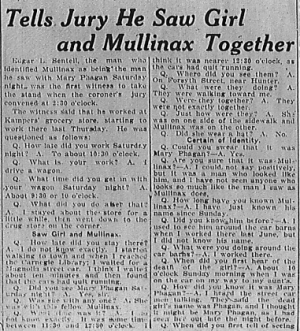 Another in our series of new transcriptions of contemporary articles on the Leo Frank case.
Another in our series of new transcriptions of contemporary articles on the Leo Frank case.
Atlanta Georgian
Wednesday April 30th, 1913
Edgar L. Sentell, the man who identified Mullinax as being the man he saw with Mary Phagan Saturday night was the first witness to take the stand when the coroner’s jury convened at 2:30 o’clock.
The witness said that he worked at Kamper’s grocery store, starting to work there last Thursday. He was questioned as follows:
Q. How late did you work Saturday night? A. To about 10:30 o’clock.
Q. What is your work? A. I drive a wagon.
Q. What time did you get in with your wagon Saturday night? A. About 9:30 or 10 o’clock.
Q. What did you do after that? A. I stayed about the store for a little while, then went down to the drug store on the corner.
Saw Girl and Mullinax.
Q. How late did you stay there? A. I do not know exactly. I started walking to town and when I reached the Carnegie Library, I waited for a Magnolia street car. I think I waited about ten minutes and then found that the cars had quit running.
Q. Did you see Mary Phagan Saturday night? A. Yes, sir.
Q. Was she with any one? A. She was with this fellow Mullinax.
Q. What time was it? A. I do not know exactly. It was some time between 11:30 and 12:30 o’clock. I think it was nearer 12:30 o’clock, as the cars had quit running.
Q. Where did you see them? A. On Forsyth Street, near Hunter.
Q. What were they doing? A. They were walking toward me.
Q. Were they together? A. They were not exactly together.
Q. Just how were they? A. She as on one side of the sidewalk and Mullinax was on the other.
Q. Did she wear a hat? A. No.
Certain of Identity.
Q. Could you swear that it was Mary Phagan?—A. Yes.
Q. Are you sure that it was Mullinax?—A. I could, not say positively, but it was a man who looked like him, and I have not seen anyone who looks so much like the man I saw as Mullinax does.
Q. How long have you known Mullinax?—A. I have just known his name since Sunday.
Q. Did you know him before?—A. I used to see him around the car barns when I worked there last June, but I did not know his name.
Q. What were you doing around the car barns?—A. I worked there.
Q. When did you first hear of the death of the girl?—A. About 10 o’clock Sunday morning when I was on the car on my way to my aunt’s.
Q. How did you know it was Mary Phagan?—A. I heard the street car men talking. They said the dead girl’s name was Phagan, and I thought it might be Mary Phagan, as I had seen her out late the night before.
Q. When did you first tell of seeing her?—A. I went right on out to the Phagan home instead of going to my aunt’s to find if it was Mary, and told them at the house that I had seen her.
Q. Where is your home?—A. My people live at East Point, but I board at 82 Davis Street.
Q. What work did you do before going with the Kamper Grocery firm?—A. I was in the Navy.
Q. When did you quit that work?—A. April 18.
Q. How long were you there?—A. About three months.
Q. Why did you quit?—A. I was discharged on account of weak eyes.
Q. What was the trouble with your eyes?—A. I could not see the targets.
Q. Do your eyes trouble you ordinarily?—A. No, sir.
Q. Are you quite sure they did not fail you when you met this girl Saturday night?—A. Yes, sir.
Q. Do you drink?—A. Sometimes, but I have never been drunk.
Q. Had you been drinking Saturday night?—A. No, sir.
Q. Did Mary Phagan look like she had been drugged?—A. No, sir, but she looked tired.
Q. Did you speak to her?—A. Yes, sir. I walked between her and Mulling and said: “Hello, Mary.”
Q. What did she say?—A. Hello, Ed.
Q. Did you talk to her any more?—A. No, sir. I walked on.
Q. Did Mary Phagan’s parents allow her to go out with boys at night?—A. No, sir.
Q. Did you say anything to her about being out so late?—A. No, sir, but I thought it was unusual.
Q. How long have you been knowing Mary Phagan?—Nearly all her life.
Q. Did you ever call on her?—A. I went to her house a good many times.
Q. Did you work all day Saturday?—A. Yes, sir.
Q. Are you sure the girl was Mary Phagan, and not some other girl?—A. I am positive that it was Mary Phagan.
Sentell was dismissed at this point and the next witness called.
* * *
Atlanta Georgian, April 30th 1913, “Tells Jury He Saw Girl and Mullinax Together,” Leo Frank case newspaper article series (Original PDF)
